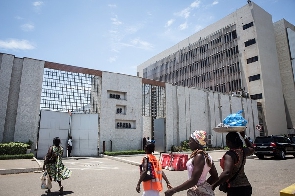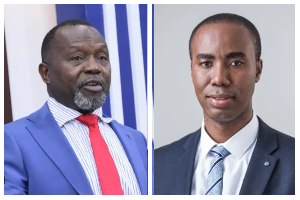The central bank has begun an internal review of the Bank of Ghana Amendment Act 2016 (Act 918), which is likely to result in a proposal for further amendments to facilitate the implementation of the law, the first deputy governor of the bank, Dr. Maxwell Opoku-Afari, has said.
He was speaking during an appearance before Parliament’s Public Accounts Committee on Wednesday to answer questions on the Auditor-General’s report for the 2017 financial year.
The report had accused the Bank of Ghana of breaching the ceiling on central bank lending to government, which Act 918 limits to not more than 5 percent of the previous year’s total fiscal revenue at any time.
However, Dr. Opoku-Afari said the report’s finding was the result of the Auditor-General interpreting the ceiling as being applicable to the total stock of outstanding government debt to the central bank, which in 2017 exceeded 5 percent of the previous year’s total fiscal revenue. On the other hand, in the central bank’s interpretation, the ceiling applies to actual central bank lending since the promulgation of the act, which was zero in 2016-2019.
“The stock of central bank financing as at the time before the act came into effect far exceeded 5 percent [of the previous year’s total revenue], so the understanding and interpretation was that the stock was ringfenced, and going forward the central bank would then not finance the budget beyond 5 percent,” the first deputy governor said.
“The central bank has also entered into an MoU with the Ministry of Finance, and we have actually limited [the financing] to zero percent. So right from 2016 when the act came into effect till now, central bank financing to the budget has been zero percent until recently when we triggered section 30 and went into the asset purchase programme,” he added.
Asked by a member of the committee whether the different legal interpretations necessitated an amendment of the law, the deputy governor stated: “We have had two to three years of implementing the act, and we have actually commissioned a team to document some of the implementation issues that have come up—[especially] those that are of material effect that will constitute the need to engage the Ministry of Finance to look at bringing a proposal to amend certain aspects of the act.”
He also told the committee that the central bank will begin talks with the Ministry of Finance to find ways to reduce the government’s outstanding stock of debt to the central bank.
Although the law permits the central bank to use part of its annual profits to offset these debts, this could not be done in the last three years because the bank made losses in 2017 and 2018, and was unable to utilise its 2019 profit to reduce the debt.
Business News of Friday, 4 September 2020
Source: thebusiness24online.net
BoG developing proposal to amend its law
Entertainment












